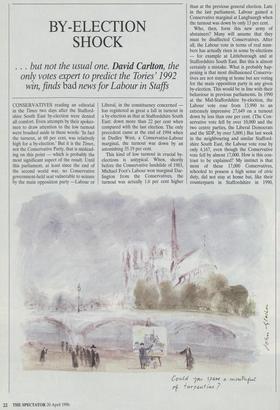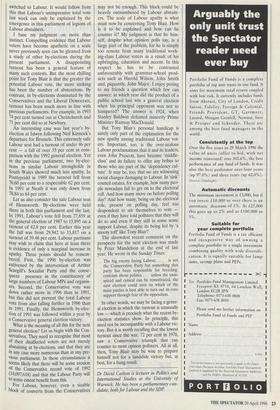BY-ELECTION SHOCK
. . . but not the usual one. David Carlton, the only votes expert to predict the Tories' 1992 win, finds bad news for Labour in Staffs CONSERVATIVES reading an editorial in the Times two days after the Stafford- shire South East by-election were denied all comfort. Even attempts by their spokes- men to draw attention to the low turnout were brushed aside in these words: 'In fact the turnout, at 60 per cent, was relatively high for a by-election.' But it is the Times, not the Conservative Party, that is mislead- ing on this point — which is probably the most significant aspect of the result. Until this parliament, at least since the end of the second world war, no Conservative government-held seat vulnerable to seizure by the main opposition party —Labour or Liberal, in the constituency concerned has registered as great a fall in turnout in a by-election as that at Staffordshire South East: down more than 22 per cent when compared with the last election. The only precedent came at the end of 1994 when in Dudley West, a Conservative-Labour marginal, the turnout was down by an astonishing 35.19 per cent.
This kind of low turnout in crucial by- elections is untypical. When, shortly before the Conservative landslide of 1983, Michael Foot's Labour won marginal Dar- lington from the Conservatives, the turnout was actually 1.6 per cent higher than at the previous general election. Late in the last parliament, Labour gained a Conservative marginal at Langbaurgh when the turnout was down by only 13 per cent.
Who, then, form this new army of abstainers? Many will assume that they must be disaffected Conservatives. After all, the Labour vote in terms of real num- bers has actually risen in some by-elections — for example at Littleborough and at Staffordshire South East. But this is almost certainly a mistake. What is probably hap- pening is that most disillusioned Conserva- tives are not staying at home but are voting for the main opposition party in any given by-election. This would be in line with their behaviour in previous parliaments. In 1990 at the Mid-Staffordshire by-election, the Labour vote rose from 13,990 to an extremely impressive 27,649 on a turnout down by less than one per cent. (The Con- servative vote fell by over 10,000 and the two centre parties, the Liberal Democrats and the SDP, by over 5,000.) But last week in the neighbouring and similar Stafford- shire South East, the Labour vote rose by only 4,167, even though the Conservative vote fell by almost 17,000. How is this con- trast to be explained? My instinct is that most of these 17,000 Conservatives, schooled to possess a high sense of civic duty, did not stay at home but, like their counterparts in Staffordshire in 1990, switched to Labour. It would follow from this that Labour's unimpressive total vote last week can only be explained by the emergence in this parliament of legions of Labour abstainers.
I base my judgment on more than instinct. Compelling evidence that Labour voters have become apathetic on a scale never previously seen can be gleaned from a study of other by-elections during the present parliament. A disappointing turnout has been a general feature of many such contests. But the most chilling point for Tony Blair is that the greater the potential Labour vote, the more striking has been the number of abstentions. By contrast, in by-elections dominated by the Conservatives and the Liberal Democrats, turnout has been much more in line with previous parliaments. For example, in 1993 74 per cent turned out at Christchurch and 71 per cent did so at Newbury.
An interesting case was last year's by- election at Islwyn following Neil Kinnock's departure for Brussels. This extremely safe Labour seat had a turnout of under 46 per cent — a fall of over 35 per cent in com- parison with the 1992 general election. Yet in the previous parliament, two by-elec- tions in similar Labour strongholds in South Wales showed much less apathy. In Pontypridd in 1989 the turnout fell from 76.60 per cent to a respectable 62 per cent. In 1991 at Neath it was only down from 78.84 to 64 per cent.
Let us also consider the safe Labour seat of Hemsworth. By-elections were held there in both this parliament and the last. In 1991, Labour's vote fell from 27,859 at the general election of 1987 to 15,895 on a turnout of 42.8 per cent. Earlier this year the fall was from 29,942 to 15,817 on a turnout of 39.46 per cent. Labour partisans may wish to claim that here at least there is evidence of only a marginal increase in apathy. Three points should be remem- bered. First, the 1996 by-election was enlivened by the intervention of Arthur Scargill's Socialist Party and the conse- quent presence in the constituency of large numbers of Labour MPs and organis- ers. Second, the Conservative vote was down rather more in 1996 than in 1991, but this did not prevent the total Labour vote from also falling further in 1996 than in 1991. Finally, the Hemsworth by-elec- tion of 1991 was followed within a year by a Conservative general election victory.
What is the meaning of all this for the next general election? Let us begin with the Con- servatives. They need to recognise that most of their disaffected voters are not merely abstaining at by-elections, and that they are in any case more numerous than in any pre- vious parliament. In these circumstances it seems likely that there will be some erosion of the Conservative record vote of 1992 (14,097,618) and that the Labour Party will to some extent benefit from this.
For Labour, however, .even a sizable block of converts from the Conservatives may not be enough. This block could be heavily outnumbered by Labour abstain- ers. The scale of Labour apathy is what must now be concerning Tony Blair. How is it to be explained and how can he counter it? My judgment is that he him- self, despite what opinion polls say, is a large part of the problem, for he is simply too remote from many traditional work- ing-class Labour voters as a result of his upbringing, education and accent. In this respect he has to be contrasted unfavourably with grammar-school prod- ucts such as Harold Wilson, John Smith and, piquantly, John Major. I enjoy posing to my friends a question which few can answer: in which year did the product of a public school last win a general election when his principal opponent was not so hampered? The answer is 1924, when Stanley Baldwin defeated minority Prime Minister Ramsay MacDonald.
But Tony Blair's personal handicap is surely only part of the explanation for the new apathy among traditional Labour vot- ers. Important, too, is the over-zealous Labour proclamations that it and its leaders, even John Prescott, have become 'middle- class' and its failure to offer any bribes to those who are part of the 'dependency cul- ture'. It may be, too, that we are witnessing social changes damaging to Labour. In 'sink' council estates, for example, how many peo- ple nowadays fail to get on to the electoral roll. And how many move on before polling day? And how many, being on the electoral role, present on polling day, feel too despondent to stir themselves to vote even if they have told pollsters that they will do so and even if they still in some sense support Labour, despite its being led by 'a snooty toff like Tony Blair? The shrewdest recent comment on the prospects for the next election was made by Peter Mandelson at the end of last year. He wrote in the Sunday Times:
The big enemy facing Labour. ... is not the Conservative Party but something that party has been responsible for breeding: cynicism about politics ... unless the unin- spired and cynical can be remotivated, the next election could turn on which of the main parties is best able to turn out its core support through fear of the opposition.
In other words, we may be facing a gener- al election in which the turnout is unusually low — which is precisely what the recent by- election statistics show. In principle, this need not be incompatible with a Labour vic- tory. But it is worth recalling that the lowest turnout since the war, 72 per cent in 1970, saw a Conservative triumph that ran counter to most opinon pollsters. All in all, then, Tony Blair may be wise to prepare himself not for a landslide victory but, at best, for a hung result.
Dr David Carlton is lecturer in Politics and International Studies at the University of Warwick. He has been a parliamentary can- didate, both for Labour and the SDP.



































































 Previous page
Previous page